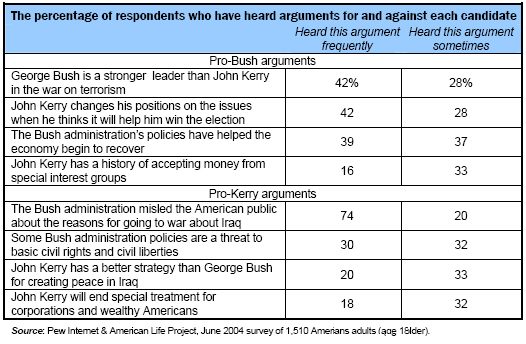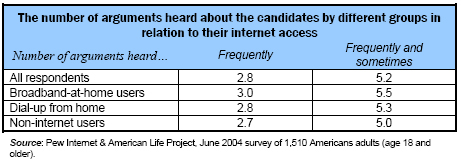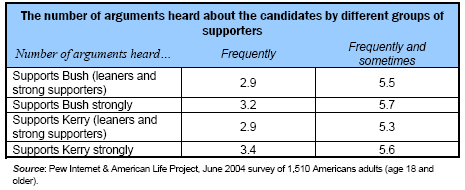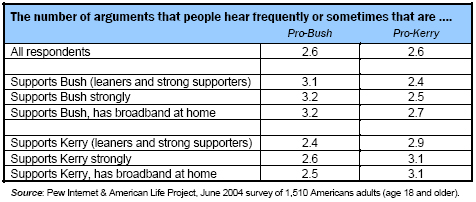Internet users get more news, but are they Omnivores, Selective Reinforcers, Tuned Outs, or Contrarians when it comes to their exposure to political arguments?
Internet users are more likely to get news on the typical day than non-users and those online users are a bit more inclined than non-users to state a preference for unbiased news sources. On its face, this is good news about the internet’s effect on democratic discourse; people who have broadband access say they prefer balance, so that the internet can expand people’s news horizons without driving them into ideological warrens of their own choosing.
However, that would be a premature conclusion for two reasons. First, there is a possibility that some respondents felt inclined to say they value news sources with no political point of view because that is a socially desirable answer to give. Those responses, then, should be interpreted with some caution. Second, and more importantly, though we know something about the relative amount of news people get from various sources, we do not know the nature of the information they get from them. A better measure of the internet’s impact on political discourse is the nature of the information people get about issues and candidates.
To probe this issue, the survey asked respondents whether they had ever heard of specific arguments about the presidential candidates or specific policy issues. We did this to get a measure of the breadth of arguments about this year’s presidential candidates and issues citizens have learned about. This section of the report will cover respondents’ exposure to arguments related to the presidential campaign.
Each respondent was also probed about exposure to arguments related to one of three issues relevant to this political season: the Iraq war, gay marriage, or free trade and the impact of globalization on the U.S. and world economies. A discussion of the internet’s impact on the information people get about those issues follows in subsequent sections of this report.
The basic question guiding this research is whether people are using the internet to confirm their views and avoid information that might challenge their views. Thus, in these sections we are trying to understand whether internet users, especially with broadband connections, are screening in arguments that back their candidate and denigrate his opponent and screening out arguments that challenge their man or on the other hand whether they are being exposed to a diversity of arguments.
We call those who gravitate towards supportive arguments and away from challenging arguments Selective Reinforcers. At the same time, we call those who expose themselves to a wider diversity of views Omnivores. A third category is evident, as well. They are the people who are largely indifferent to information of any kind – that is, they are largely unaware of information that supports their views or challenges them. We call them the Tuned Outs. Finally, there is a sizable minority of people who are drawn to arguments contrary to their views, while not encountering very many of the arguments that support what they believe. We call them Contrarians.
The internet’s role is of main interest. Are people who get their news online more likely to be Omnivores and Contrarians? Or are they disproportionately Selective Reinforcers?
How much argument for and against the presidential candidates are internet users encountering?
To measure people’s exposure to information about the presidential race, respondents were read eight statements, four that either favor George Bush or criticize John Kerry and four that either favor Kerry or criticize Bush. We chose arguments that were evident in the candidates’ speeches, campaign ads, or other campaign material, or because they were prominently mentioned in the news media. We intentionally selected a mix of high- and low-prominence statements to help ensure that some arguments would be unfamiliar even to those who regularly follow the campaign.
The following table shows the percent of respondents who had heard these statements about the candidates either frequently or sometimes. At the time of this survey, 44% of all respondents said they would vote for George Bush if the election were held today (sometime between June 14 and July 3, 2004), 39% said they would vote for John Kerry, 7% said Ralph Nader, and 10% were undecided.

The amount of exposure respondents have had to arguments about the candidates does not vary a lot based on whether people use the internet or not.
On average, a respondent had heard of 5.2 of arguments either sometimes or frequently. Focusing on only having heard an argument frequently, respondents had heard of 2.8 arguments frequently.
Respondents, on average, are about as likely to have heard arguments sympathetic to Bush (either for Bush or critical of Kerry) as to have heard arguments sympathetic to Kerry (either for Kerry or critical of Bush). The typical respondent heard frequently 1.4 arguments tilting Bush’s way and 1.4 arguments favoring Kerry. Summing statements heard sometimes or frequently yields 2.6 statements heard that favor Bush and 2.6 statements heard that favor Kerry.
There are small variations across types of internet connections and whether one is an internet user. As the following table shows, broadband internet users have, on average, heard of more arguments about the candidates than dial-up users, and both types of internet users have heard more arguments than non-users. Broadband connections at home have the largest impact, it seems, for arguments “sometimes” heard, suggesting that the easy access to information enabled by broadband may foster casual encounters with arguments people might otherwise not hear.

More variation emerges when comparing respondents who say they support Bush with those who support Kerry, and when comparing subsets of the respective supporters who support their candidate strongly. The partisans – those who support either Kerry or Bush strongly – are more likely to have heard various statements about the candidates than average.

There is some evidence of selective exposure or belief reinforcement, but it is not associated with use of the internet. In fact, use of the internet exposes users to a wider array of arguments.
Our data offer a way to consider whether selective exposure is occurring and the extent to which the internet is a factor in it. To do this we examine the degree to which those who support one candidate have heard arguments in favor of the other. In other words, are people who support Bush hearing many arguments sympathetic to Kerry, and vice versa?
The tables below show that some degree of selective exposure appears to exist when comparing the number of pro-Kerry arguments heard by Bush supporters with the average, and then the number of pro-Bush arguments heard by Kerry supporters. Partisans of a particular candidate are more likely than the average to have heard arguments that support their candidate, but are only slightly less likely than average to have heard arguments that favor the candidate they don’t support.
However, use of the internet, especially with high-speed links at home, doesn’t exacerbate selective exposure. Rather, broadband use seems to diminish selective exposure somewhat. Those with broadband are exposed to more arguments than others.

Many of the traits of internet users are tied to their interest in politics. Yet, when we control for all those other factors, it is clear that their internet use alone is a factor in their wide exposure to political arguments.
For both general exposure to information and selective exposure to information there seem to be internet effects. The internet seems associated with higher levels of exposure to statements about the presidential candidates, and seems to mitigate tendencies among partisans to ignore dissonant views.
In either instance, the apparent internet effect needs to be tested further. Other attributes of internet users, separate from their status as online users or speed of their home connections, may be behind these effects. Internet users, for example, may be more interested in the campaign (and thus perhaps in getting a variety of information on it) or may have higher levels of education, which may encourage people to seek out lots of campaign information.
This section reports the results of regression analysis, which enables the independent effects of the internet and various other variables, to be isolated.
The internet’s effect on overall information exposure
For exposure to statements about the candidates, both favorable and unfavorable, a number of factors, many of them having nothing to do with the internet, have independent positive effects on the number of statements people say they have heard.
People who say they follow the campaign very closely are aware of a wider range of statements about the candidates than other Americans. The same is true of older people, compared to younger Americans. Being a male is associated with higher rates of awareness of statements about the candidates. And the other demographic finding of note was that English-speaking Hispanics were significantly more likely than average to have heard a wider range of arguments, while Blacks were less likely than average to have heard a wide range of arguments.
In a number of ways, the survey also measured people’s openness to finding out about different or new things. People who said they like to read about different subjects or enjoy hearing about politics and world affairs were aware of a wider range of arguments about the candidates than others who were less inclined to do wide-ranging reading or inquiries.
We also asked respondents about their attitudes towards exposure to information – for instance, whether they like news sources with no point of view, or those that conform to their points of view, or those that challenge their point of view. Interestingly, those questions did not generally yield significant results. People who say they like news from sources that share their point of view were no more or less likely to hear statements about candidates. Those who like news with no point of view are not significantly different than those who don’t. Finally, those who like news that challenge their point of view are no more likely to have heard statements about the candidates.
Internet use did have an independent and positive effect on the number of statements people heard about candidates. Simply being an internet user, controlling for demographic factors such as gender and education, as well as the other factors already discussed, increases the likelihood that a person has heard more arguments about a candidate. Not surprisingly, specific online behaviors pertaining to the election season, (e.g., getting campaign news online or going online to get more in-depth news about the campaign) also increased the chances that a respondent had heard more arguments about the candidates.
In sum, the strongest predictors of the breadth of arguments heard about the candidates are interest in the campaign and advancing age. As for media use, the internet expands people’s informational horizons about the candidates, as does daily attention to TV news and the newspaper.
The internet’s effect on exposure to arguments that challenge users’ political views
To assess whether people are avoiding information that opposes their points of view, our analysis focuses on the amount of information they have heard that challenges their candidate preference. In this way, a positive association means that people are finding out arguments for the other candidate or critical of their own. Conversely, a negative association means a factor contributes to people not finding out about arguments that are critical of their candidate.
The results for exposure to challenging arguments are not too different from what we found when looking at people’s overall exposure to information about the candidates. For Bush supporters, those who have high-speed internet connections at home were significantly more likely than non-users to have heard arguments favorable to John Kerry. For Kerry supporters, the internet effect was positive, as well.
In sum, people are not using the internet to avoid information and arguments that challenge their candidate preferences.
Still, the internet’s role is only part of the story here. People’s degree of open-mindedness and their overall interest in the campaign also have a big impact on their exposure to challenging arguments. People who are not interested in the campaign – those who are not likely to hear a lot of arguments of any kind about the candidates – are not likely to hear opposing views.
Those who expressed open-mindedness in our survey also were exposed to more challenging arguments. For instance, those who showed a willingness to revise their beliefs, those who showed enjoyment of politics and world affairs, and those who showed a desire to gather facts about issues before taking a position, were also more likely than others to be exposed to arguments that opposed their candidate.
There is also the perhaps less interesting case of partisan selectivity, that is, what drives the number of arguments the supporter of a candidate has heard about his or her favored candidate. Again, the internet is a door opener. For Kerry supporters, those who have gone online for campaign news are more likely to have heard a greater number of arguments than those who have not done this. The same is true for Bush supporters, though at a lower level of statistical certainty than for Kerry supporters.
The political information “market” segments four ways.
On average, respondents said they had heard of 5.2 out of the eight arguments presented about the presidential candidates, but there is variation within the population on the nature and amount of information they have encountered about the candidates. Americans who have a position on the two major-party presidential candidates sort into four groups in their predilections for finding out information about the presidential race. Again, for this report, 44% of respondents supported Bush and 39% supported Kerry.
- Omnivores: These are people who have heard three of more of the four arguments about each of the two candidates. Fully 43% of Bush or Kerry supporters fall into the category of having heard at least three pro-Bush arguments and three pro-Kerry arguments. A bit more than half of omnivores (53%) are Bush supporters and 47% support Kerry, which is not any different than the relative preferences for the two candidates among the entire sample.
- Selective Reinforcers: People in this group have heard three or more of the arguments that favor the candidate they support, but only two or fewer of the arguments in favor of the other candidate. They make up 29% of respondents who said they support either Kerry or Bush. Close to two-thirds of this group are Bush Selective Reinforcers, meaning they know all the arguments in favor of Bush but no more than two pro-Kerry arguments. A bit more than one-third of this group is Kerry Selective Reinforcers.
- Tuned Outs: This is a group of people who, even though they support one of the two candidates, tune out of political debates. These are the people who have heard two or fewer arguments about either candidate. Roughly 21% of those with a position on the candidates fall into this category.
- Contrarians: About 8% of those with a position on the candidate are contrarians, meaning they support a specific candidate, know comparatively few of the arguments in favor of that candidate, but a lot about the candidate they do not support.
Omnivores are the most politically interested and news-hungry group. Fully half (52%) say they follow the campaign very closely (versus 31% of all Americans) and 83% watch TV news on the typical day and 66% read the newspaper on the average day, well above the figures for all Americans of 73% and 50% respectively. Omnivores are also more likely to get news online on the typical day; 39% compared with the 27% for others.
Omnivores also fit the profile of technologically sophisticated Americans. Nearly three-quarters (73%) go online, compared with 65% of everyone else, and 31% of high-speed connections at home versus 23% of everyone else. This group is more educated (37% have college degrees versus 20% of everyone else), more likely to be male (54% are), and white (85% are versus 76% of those in other groups).
Selective Reinforcers distinguish themselves from Omnivores in their lower level of interest in the political campaign and less ardent consumption of news. About 28% of Selective Reinforcers say they follow the campaign very closely, 47% read the newspaper on the typical day and 72% watch TV news. As for online news consumption, 30% go to the internet for news on the typical day, which is right at the average for all respondents. And 69% of all Selective Reinforcers are internet users, with 26% having high-speed connections at home. In sum, Selective Reinforcers are, as a group, very much the average American when it comes to interest in politics, news consumption, internet use, and other variables such as gender and level of education.
The Tuned Outs, even though they have developed a preference for a candidate, are simply not very interested in politics and public affairs. Just 12% have followed the presidential campaign very closely, 38% get news from the newspaper on the average day, and 62% get news from the television. Only 23% get news online on the typical day, and this group has relatively low internet penetration. Three in five (60%) go online, and 17% have high-speed connections at home (versus 25% for all Americans). This group has lower levels of educational attainment (15% are college graduates) and is more diverse racially, with 70% whites, 22% blacks, and 11% English-speaking Hispanics (the figures do not sum to 100 because the categories were not mutually exclusive). Finally, 60% of Tuned Outs are women.
The Contrarians by and large have somewhat below average stated interest in the campaign and public affairs. Still, they are willing to reach out to find out information about the presidential campaign. About a quarter of this group say they follow the campaign very closely, half get news from the newspaper on the average day, and about one quarter get news online on the typical day. They also come in about average in terms of overall internet penetration and use of high-speed at home. As a group, Contrarians tilt toward women (57%) and the college educated (33% have at least college degrees). Though it is hard to sum up the Contrarians, they seem to have an interest in the campaign – enough to have encountered just about the average number of arguments about the candidates – but the presidential race is not a consuming passion for them.
Americans’ perceptions of media bias don’t influence their exposure to pro and con arguments about candidates.
Respondents were asked whether they believe that the media has a bias in the way the presidential campaign is covered, and the results were very different for Kerry and Bush supporters. Nearly half of Bush supporters see a media biased in favor of Kerry, a fifth of Kerry supporters say this about media coverage in Bush’s favor.

However, these perceptions of bias do not seem to correlate with the number or nature of the arguments that people have heard. Bush supporters’ exposure to pro-Kerry arguments was no higher than Kerry supporters’ exposure to pro-Bush arguments. And Bush supporters’ exposure to arguments for their man was slightly higher than Kerry supporters’ exposure to argument for their man.




